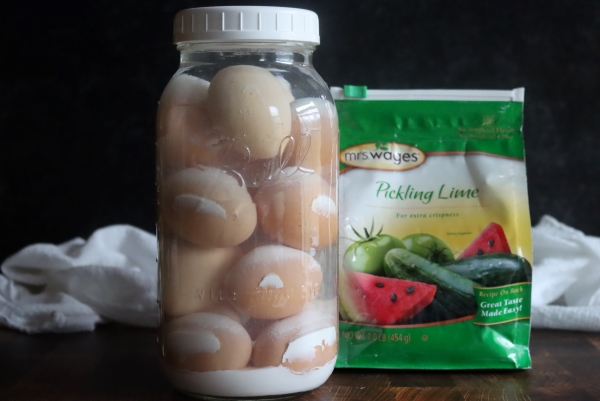
Place the eggs in a large jar and cover with the brine. Wrap each egg separately in a waxed or paraffin paper.

Do take note that eggs preserved in wood ash may have a stale taste.
Preserving eggs in brine. While the eggs are boiling prepare the brine. Heat the water and add the salt all the spices and the unpeeled onion. The brine will be a dark brown liquid.
Bring to a boil then allow to simmer for 15 minutes. Place the eggs in a large jar and cover with the brine. Close the jar and store in a cool place.
Salted egg is a popular preserved Chinese food. Fresh duck eggs are soaked in brine salty water for about 20 to 30 days or packing each egg in damp salted charcoal. This method draws water out of bacteria and mold hence stop their growth.
It is traditionally used in making savoury dumplings Zong 粽 during. Salted Eggs in Brine Solution Ingredients. 12 Ducks eggs 12 cups water 6 cups salt.
Boil 6 cups salt with 12 cups water. Cool the mixture after boiling. Carefully place 12 duck eggs in a wide mouth glass jar.
Pour the brine solution into the jar. Weigh down the eggs with a plate to keep them from floating or instead of jar. Beet juice optional if you want pink eggs Bring the brine to a boil and let it simmer for ten minutes then strain it and pour it into the jar with the eggs.
Be sure to completely cover the eggs with the brine. Put on the lid tightly and refrigerate. A newspaper from 1913 describes the process of preserving eggs in paraffin wax Dip fresh eggs one at a time in hot melted paraffin enough to cover the egg.
Take out immediately with wire tongs made for that purpose of baling wire let paraffin harden and dip quickly again reversing egg. Wrap each egg separately in a waxed or paraffin paper. Wrap carefully so as rot to scratch or break the coating.
Fermented eggs are infused with whatever flavours you include in your brine. So I recommend playing around with all sorts of different flavours. To make coloured pickled eggs ferment with colourful fermented foods.
Pour the spiced vinegar brine into the jar with the eggs and onions. Allow the eggs to cure in the brine for at least a week before you consume them. Historical Methods For Preserving Eggs In addition to lime-water preservation there are many other methods used over the last several hundred years to keep eggs longer than they could last naturally.
DRYING With this method eggs are cracked beaten and then dehydratedeither in a commercially purchased dehydrator or in an oven. Salt is the preservative in brine and it works by actually removing water from the cells. If a cell is unable to intake more water they die.
Its as simple as that. That is why covering meat in salt has been used for ages to preserve. Mix together and place eggs into brine for 1 ½- 2 hours.
Once your eggs are really cool and you have slipped them away from their egg shells plop them into the brine mix. I can fit a lot of eggs in this brine. Ive done up to 20 before and can fit more.
Just be sure the brine covers the eggs. Hard boiling and peeling the eggs you place them in the brine solution with several spices and store in a jar or container in the refrigerator. Canning them or leaving the pickled egg jar on the counter is NOT recommended as several people have had fatal repercussions.
Preserving eggs in wood ash. Wood ash the ash that you clean out of a wood stove can be used to preserve eggs. Eggs stored in wood ash have loss rates of about 20 percent after six months with only 40 percent spoilage after eight months.
Do take note that eggs preserved in wood ash may have a stale taste. Preserving eggs in oats or bran. Join the Waitlist NOW to be the first into the upcoming PRACTICAL HOMEMADE DAIRY Masterclass from Homesteading Family.
If youve wanted to learn how to make. Sources recommend leaving small and medium eggs in brine for at least 2 weeks to fully pickle and as much as 4 weeks for large eggs. Even still the pickled acidity may never actually reach the center of.
If you want to preserve fresh raw eggs without using a refrigerator they can be preserved in a salt brine but they are not going to come out as good tasting or as versatile in cooking as fresh. Cool the jar to room temperature. Refrigerate it for safe keeping.
Ideally you should let them sit for several days before eating to make sure that the eggs have absorbed the brine.